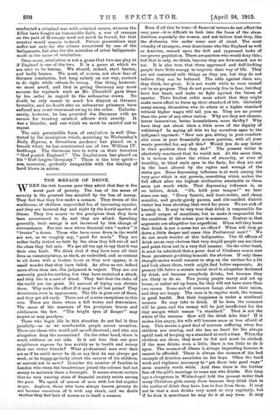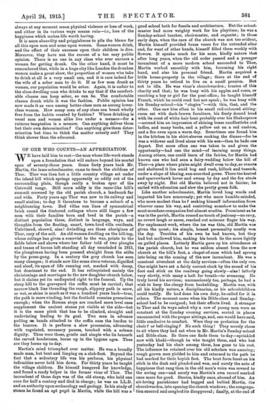THE MENACE OF DRINK.
WHEN the rich become poor they admit that fear is the worst part of poverty. The loss of the sense of security is the greatest loss entailed by the loss of money. They feel that they live under a menace. They dream of the workhouse, of children nnprovided for, of increasing squalor, and they are haunted day and night by the horrid spectre of illnesa. They live nearer to the precipices than they have been accustomed to do, and they are afraid. Speaking generally, their energy is not incream.ed by this change of circumstance. For one man whom financial ruin " makes" it "breaks" a dozen. Those who have come down in the world are not, as we roughly say, "good for much." They are rather badly looked on both by the class they fell out of and the class they fell into. We are all too apt to say that it was their own fault. We think that if they have been all their lives as unenterprising, as slack as undecided, and as content to sit down with a broken heart as they now appear, it is small wonder that they have failed. As often as not, indeed more often than not, this judgment is unjust. They are not naturally good-for-nothing, but they have sustained a shock, and they live in a sort of dread. They feel that the risks of the world are too great. No amount of trying can obviate them. Why make the effort if it may be all lost pains ? They deteriorate even in appearance. The life is gone oat of them, and they get old early. There are of course exceptions to this wile. There are those whom a fall wakes and determines. The sense of the nearness of the precipices braces and exhilarates the few. "The bright eyes of danger" may inspire or may paralyse.
Those who begin life in this situation do not feel it thus painfully—or so we comfortable people assure ourselves. There are those who would call us self-deceived ; and who can altogether deny the accusation ? On the other hand, there is much evidence on our side. Is it not true that our poor neighbours express far less anxiety as to health and money than oar richer friends? What professional man ever dare act as if he could never be ill, or say that be can always get work, or be happy-go-lucky about the careers of his children, or content not to save? Consider the number of families in London who when the breadwinner joined the colours had not money to maintain them a fortnight, It seems almost certain that no very wearing state of financial anxiety exists among the poor. We speak of course of men with low but regular weges. Anyhow, those who have always known poverty do not become conevieua of it with any shock, and we doubt whether they feel lack of means as in itself a menace. Even if all this be true—if financial terrors do not affect the very poor—it is difficult to look into the faces of the alum- dwellers, especially the women, and not believe that they, like the cleclassees, live under some sort of Mond. The mesh friendly of strangers, even Americans who like England as well as America, remark upon the dull and oppressed looks of our poorer population_ There are patriots who would deny this ; but that is only, we think, because they are determined not to see. It is also true that these oppressed and dall-looking people have little energy to improve their way of life. They are not contented with things as they are, but they do not believe they can be bettered. The odds against them are, they think, too great. It is not worth while to wear oneself out to no purpose. They do not precisely live in fear, but they have lost heart, sad make no fight against the forces of squalor. Their kindest critics must admit that they might make more effort to force up their standard of life. Certainly many among themselves who do attain to a higher standard without higher wages will tell you so. They are no poorer than the poor of any other nation. Why are they not cleaner, better housewives, better housefathers, more thrifty ? Why have they not about them a little more of the dignity of welldoing? In saying all this we lay ourselves open to the indignant reproach: " How can you, sitting in your comfort- able room in year financially secure position, with all your wants provided for, say all this? Would you do any better in their position than they do?" The present writer is absolutely convinced that he would not. At the same time, it is melees to allow the virtue of sincerity, or even of humility, to blind one's eyes to the facts, for they are not in the least altered by the rights and wrongs of the status qua. Some depressing influence is at work among the very poor which is not poverty, something which makes the full effort after the highest civilization attainable to them seem not worth while. That depressing influence is, as we believe, drink. "Oh, hold your tongue!" we hear some one say. "Every fanatic, and tract-writer, and cheap moralist, and goody-goody parson, and old-maidish district visitor has been shouting that word for years. We are sick of hearing it. It may be very true that drink is responsible for a small output of munitions, but to make it responsible for the condition of the urban poor is nonsense. Dealers in that argument are altogether too superficial. When will they learn that drink is not a cause but an effect? When will they go down a little deeper and cease this Puritanical cant ? " We do not much wonder at this indignation. The ill effects of drink are ao very obvious that very stupid people can see them and point them out in a very dull manner. On the other hand, it must be admitted that a great deal of blindness comes now from persistent grubbing beneath the obvious. If only these thought-moles would consent to stop on the surface for a bit and look about them, truth might find better exponents. At present life below a certain social level is altogether darkened. by drink, not because everybody drinks, but because they are likely to do so. Two young people marry and set up house, or rather set up home, for they will not have more than two rooms. Some sort of romance hangs about their union, and they are happy. The man is in regular work, the woman in good health. But their happiness is under a continual menace. He may take to drink. If he does, the romance will be gone, and the money will be just insufficient for the tiny margin which means "a standard." That is not the whole of the menace. How will the drink take him? If it makes him angry, his wife will become more or less afraid of him. This means a good deal of nervous suffering when her children are coming, and she baa no heart for the always uphill task of keeping up a standard at such a time. When the children are there, they must be fed and must be clothed. If the man drinks even a little, there is too little to do it upon. The menace of illness is always impending because it cannot be afforded. There is always the menace of the bad example of drunken associates on the boys. Often the hard work and vigilance necessary to " get them into good ways" seem scarcely worth while. And then there is the further fear of the girl's marriage to some one who drinks. Not long ago a clergyman in W bitechapel told the present writer that many Christian girls marry Jews because they think that in the matter of drink they have less to fear from them. It may not be that a man drinks very mach or very regularly, but if be does it sometimes be may do it at any time. It may
always at any moment mean physical violence or loss of work, and either in its various ways means ruin—i.e., loss of the happiness which makes life worth having.
It is mere absurdity and priggishness to pile the blame for all this upon men and none upon women. Some women drink, and the effect of their excesses upon their children is dire. Moreover, they have not the excuse of a too easy public opinion. There is no one in any class who ever excuses a woman for getting drunk. On the other band, it must be remembered that, while in a huge city like London the drunken women make a great show, the proportion of women who take to drink at all is a very small one, and it is rare indeed for the wife of a sober man to do it. If as few men drank as women, our population would be sober. Again, it is unfair to the slum-dwelling man who drinks to say that if the comfort- able classes can keep sober, so can he. The comfortable classes drank while it was the fashion. Public opinion has now made it as rare among better-class men as among lower- class women. How many men of any class can break wholly free from the habits created by fashion? Where drinking is usual men and women alike live under a menace—for a ruinous temptation is a menace. Can anything deliver them but their own determination? Can anything give them deter- mination but time to think the matter soberly out P They think slower than the educated.















































 Previous page
Previous page